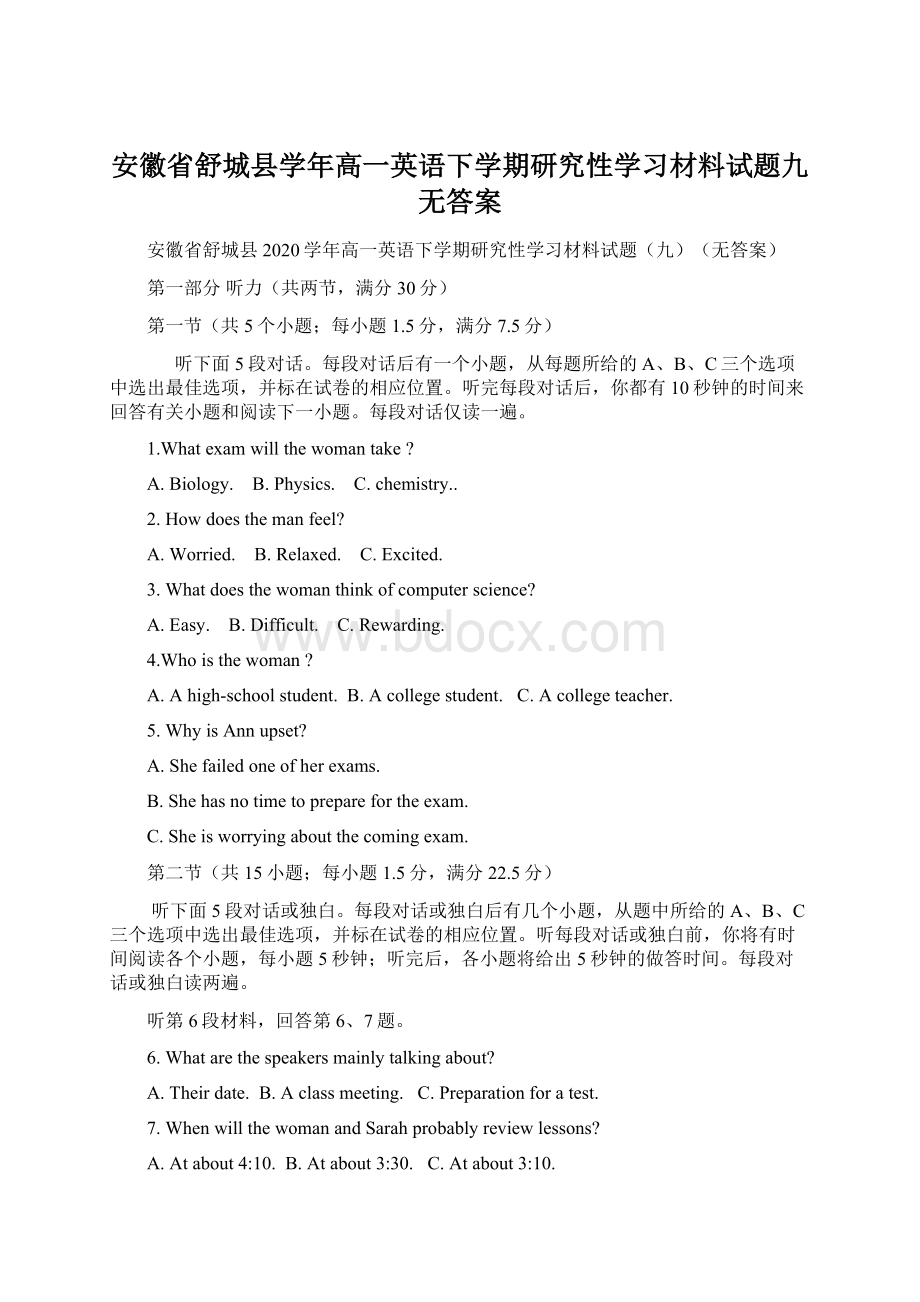安徽省舒城县学年高一英语下学期研究性学习材料试题九无答案.docx
《安徽省舒城县学年高一英语下学期研究性学习材料试题九无答案.docx》由会员分享,可在线阅读,更多相关《安徽省舒城县学年高一英语下学期研究性学习材料试题九无答案.docx(12页珍藏版)》请在冰豆网上搜索。

安徽省舒城县学年高一英语下学期研究性学习材料试题九无答案
安徽省舒城县2020学年高一英语下学期研究性学习材料试题(九)(无答案)
第一部分 听力(共两节,满分30分)
第一节(共5个小题;每小题1.5分,满分7.5分)
听下面5段对话。
每段对话后有一个小题,从每题所给的A、B、C三个选项中选出最佳选项,并标在试卷的相应位置。
听完每段对话后,你都有10秒钟的时间来回答有关小题和阅读下一小题。
每段对话仅读一遍。
1.Whatexamwillthewomantake?
A.Biology.B.Physics.C.chemistry..
2.Howdoesthemanfeel?
A.Worried.B.Relaxed.C.Excited.
3.Whatdoesthewomanthinkofcomputerscience?
A.Easy.B.Difficult.C.Rewarding.
4.Whoisthewoman?
A.Ahigh-schoolstudent.B.Acollegestudent.C.Acollegeteacher.
5.WhyisAnnupset?
A.Shefailedoneofherexams.
B.Shehasnotimetopreparefortheexam.
C.Sheisworryingaboutthecomingexam.
第二节(共15小题;每小题1.5分,满分22.5分)
听下面5段对话或独白。
每段对话或独白后有几个小题,从题中所给的A、B、C三个选项中选出最佳选项,并标在试卷的相应位置。
听每段对话或独白前,你将有时间阅读各个小题,每小题5秒钟;听完后,各小题将给出5秒钟的做答时间。
每段对话或独白读两遍。
听第6段材料,回答第6、7题。
6.Whatarethespeakersmainlytalkingabout?
A.Theirdate.B.Aclassmeeting.C.Preparationforatest.
7.WhenwillthewomanandSarahprobablyreviewlessons?
A.Atabout4:
10.B.Atabout3:
30.C.Atabout3:
10.
听第7段材料,回答第8至10题。
8.Whoisthewomanprobably?
A.Aprofessor.B.Asecretary.C.Astudent.
9.WhenmightthemanarriveinLosAngeles?
A.AroundJune15th.B.AroundJune1st.C.AroundMay15th
10.Whowillthemancontactuponarrival?
A.Thewoman.B.Thewoman’ssecretary.C.Theadministrationoffice.
听第8段材料,回答第11至13题。
11.Howsoonwouldtheman’saccounthavebeenclosed?
A.Inaboutamonth.B.Inabouttwoweeks.C.Inaboutoneweek.
12.Whatistheaccountname?
A.Lee5566.B.ALCP5566.C.LACP6655.
13.Whywon’ttheaccountbeclosed?
A.Themanisateachernow.
B.Themanisagraduatestudentnow.
C.ThemanisaletterfromSteveSpringer.
听第9段材料,回答第14至17题。
14.Wheredoesthisconversationprobablytakeplace?
A.Intheopenair.B.Inaphotostudio.C.Ataphotoexhibition.
15.Whydoesthewomancometoseetheman?
A.Tolookforajob.B.Toborrowequipment.C.Toaskforsomeadvice.
16.Whatkindofthingsshouldthewomangetforhertrip?
A.Anewcamera.B.Somespeciallenses.C.Alighttent.
17.Howwillthewomanpayfortheequipment?
A.Byworkingfortheman.B.Bycreditcard.C.Bycash.
听第10段材料,回答第18至20题
18.Howlatecanstudentstudywhilelivingoncampus?
A.Aslateastheylike.B.Aslateas11:
00p.m.C.Nolatethanmidnight.
19.Whichofthefollowingistheadvantageoflivingoffcampus?
A.It’sgenerallycheaper.
B.Studentscanmakemorefriends.
C.Studentscanenjoybetterlivingconditions.
20.Whatmeasuresshoulduniversitiestakeaccordingtothespeaker?
A.Buildmoredormitories.
B.Enforcesafetymeasures.
C.Makestricterdormrules.
第二部分 阅读理解 (共两节,满分40分)
第一节(共15小题; 每小题2分,满分30分)
阅读下列短文,从每题所给的四个选项(A 、B 、C 和 D )中,选出最佳选项,并在答题卡上将该项涂黑。
A
CalvinGilliandidn’tbelievethatNorwaywastheplaceforanadventurousholiday.However,somefriendstoldhimtogothereandhelovedit.
“I’manextreme-sportsmaniac.I’vetraveledtomanydifferentcountries,butIdidn’texpectNorwaytobeagoodplaceforanextremeholiday.TouristsusuallyvisitNorwaybecauseofitsoldVikinghistoryortogofishingandboatinginthefamousfjords(峡湾)toenjoyarelaxingholiday,ortogoclimbingtoenjoythebeautyofnature.ButIdidn’tgoforfishing;Iwantedadventure.
“SkiingisthebestthingyoucandoinNorway.Svartisen,theBlackIceglacier(冰川),iswonderful.Theiceisnottheusualwhitebutadeepbluecolor,likethesea.However,youhavetowearspecialclothes,becauseskiingonamillion-year-oldglaciercanbeverydangerous.”
“Then,thereisHunderfossenFamilyParkforTollPark.Youcangowaterskiingandiceskating.ItiscertainlyabeautifulplacebutitismoreexpensivethanvisitingotherpartsofNorway.
“IalsovisitedtheHomenkollenSkiJumpinOslo.Theviewfromthetopoftheskijumpwaswonderfulandtheskimuseumwasveryinteresting.Iwantedtotryajumpbutunfortunately,it’sonlyforprofessionalski-jumpers.Anyway,IwasverytiredandIneededabreak,soIwentbacktomyhotelandgotsomesleep.
“Nextyear,IamgoingtotakemygirlfriendtoNorway,too.SheishavingherholidayinAustralianowandshewantstohaveadifferenttypeofadventurefornextyear.”
21.HowdidCalvinGillianfeelabouthistrip?
A.BoredB.RelaxedC.SatisfiedD.Disappointed
22.Theunderlinedword“maniac”(inpara.2)referstosomeonewho___.
A.hasastronginterestinsomething
B.hasabadopinionofsomething
C.expectsthingstobesuccessful
D.likestocompetewithothers
23.WhatdidCalvinGilliandoinNorway?
A.Ski-jumpingB.ClimbingC.FishingD.Skiing
24.What’sthebesttitleforthetext?
A.CalvinGillian’sHolidayCountriesB.TravelinDifferentCountries
C.HistoricalPlacesinNorwayD.ANorwegianAdventure
B
Breakfastisnotonlythemostimportantmealoftheday,itisalsothemostneglected.Commonreasonsfornoteatingbreakfastincludelackoftime,notfeelinghungry,traditionaldislikeforbreakfast,anddieting(节食).
Breakfastsimplymeans“breakthefast”.Yourbodyspendsatleast6to12hourseachnightinafastingstate.Inthemorningyourbodyneedsenergyfortheday’sworkahead.
Agoodbreakfastshouldprovideupto1/3ofyourtotalcaloriesneedsfortheday.Onaverage,weeat400lesscaloriesforbreakfastthanfordinner.Ifbreakfastdoesn’tattractyouinthemorning,tryeatingalighterdinnerintheeveningorsavehaleofyourdinnerforthebreakfastinthemorning.
Ifyouaren’thungryinthemorning,startwithsomethingsmalllikejuiceortoastorhaveanutritious(有营养的)mid-morningsnackwhenyouarehungry.
So,yousayyou’reonadiet.Somepeoplefeareatingbreakfastwill
makethemhungrierduringthedayandtheywilleatmore.Itistruethateatingbreakfastislikelytomakeyoueatmore.That’sbecauseyourbodyisworkingalldaylong,infact,youareprobablynot.Noteatingbreakfastcanalsocauseyoutoovereat,sinceafallinbloodsugaroftenmakesyoufeelveryhungrylater.Tomakemattersworse,sinceyourbodyisinaslowedstateitwillnotbeabletoburnthoseextracaloriesveryquickly.Ifyoufeedyourbodyhealthysnacksandmealsthroughtheday,youarelesslikelytobecomehungryandfillyourselfassoonasyoubegintoeat.Sincebreakfastisthefirstandmostimportantmealoftheday,choosingtherightfuelisimportant.Thebestbreakfastfoodsarefruits,juice,leanmeat(瘦肉),andgrainproductssuchasbread,rice,noodles,andcereals.(谷物)。
25.WhichofthefollowingstatementisNotthereasonfornothavingbreakfast?
A.Theirtimeislimited.B.Theywanttoloseweight.
C.Theirstomachsarefull.D.Theywanttostartworkearly.
26.What’sthemeaningoftheword“fast”inthephrase“breakthefast”?
A.movementB.certainkindoffood
C.quicknessD.goingwithoutfood
27.Ifyoudon’twanttohavebreakfastinthemorning,thewritersuggestsyou.
A.havesomesnackswhenhungryB.seeadoctortohaveanexamination
C.haveagooddinnerD.gotoarestauranttoenjoyagoodmeal
28.Fromthepassage,wecanknowthewriterbelieves.
A.it’sOKnottohavebreakfastB.it’simportanttogoonadietatbreakfast
C.youcandecidewhethertohavebreakfastD.it’snecessarytohavearightbreakfast
C
Inthetop10ofunpleasantsounds,acryingbabyranksveryhigh.Itinstantlymakesakeypartofyourbraincalledtheamygdale(杏仁孔)active,which,amongotherthings,actsasasortofradarforemotionalthreats.Sowhywouldbabiesneedtocausethissortofurgentreaction?
Togetyoutorespondandfasttoensuretheirsurvival.
Babiescan’tfendforthemselves.Theyarelikechicksintheirparents’nest,dependingonotherstokeepthemwarm,fedandsafe.Likechicks,theircriessignaldrivingnecessitiessuchasaneedforfoodorprotectionfromdanger.Buthumanbabiescanalsoconveyarangeofotherneedswithcries.
Humanbabiesarealsohighlysocial,andareinterestedinengaginginadialoguewiththeircaregivers.Sotheyareequallyattentivetotheirparents’signals:
themessagesconveyedbythebodylanguageoftheircaregivers—howtheparentsmells,touches,holds,rocks,aswellastheirtoneofvoice.Inrelaxedmomentswiththeparent,theysoondiscoverhowsmilingatanattentiveadulttendstocauseapositiveresponseinreturn.
Ontheotherhand,theseearlyattemptsatcommunicationbetweentheparentandchildcanbeveryhit-and-miss.Inthefirstfewweeks,mostbabiescryforabouttwohoursaday.Whentheparentandbabyaren’t“getting”eachother,cryingcanincrease.Inparticular,longdifficultieswithbreast-feedingcanleadtoapatternof“establishedfirmly”cryingbehavior.
Cryingisasignalthatcanmeanmanydifferentthings.Thelessonsthatarelearnedfromtheseearlyexperiencesarehighlysignificantforindividuallives,butcollectivelytheyalsohaveagreateffectonourculture.
29.Accordingtothefirstparagraph,whatisbabies’purposeofcrying?
A.Tochangetheircomfortablesituationatthepresenttime.
B.Tocommunicatewithparentsandlearntousebodylanguage.
C.Tomakecaregiversfastrespondtoguaranteetheirsurvival.
D.Togetsomethingthattheywanttogetasquicklyaspossible.
30.Whatdoestheunderlinedphrase“fendfor”inPara.2mean?
A.feedB.lookafterC.supportD.makeup
31.Whydohumanbabiespayattentiontotheirparents’signals?
A.Becausetheyhopetogetmorefromtheirparents.
B.Becausetheywanttoconveymessagestotheirparents.
C.Becausetheyneedtolearnfromtheirparentshowtocommunicate.
D.Becausetheyaresocial